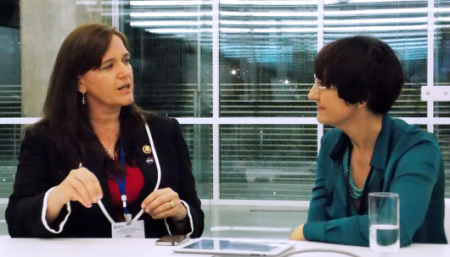|
Editor-in-chief of the "Information Society" journal Tatiana Ershova had an interview with "evangelist" of Open Government in USA Jeanne Holm |
|
 This interview turned out to be extremely
current thanks to the fact that in April 2012 Russia expressed desire to join
the Open Government Partnership, OGP – international organization, which unites more than 50 countries. This interview turned out to be extremely
current thanks to the fact that in April 2012 Russia expressed desire to join
the Open Government Partnership, OGP – international organization, which unites more than 50 countries.
Jeanne
Holm is currently the Chief Knowledge
Architect at Jet Propulsion Laboratory at NASA, where part of her duties is propaganda of
innovations in the sphere of knowledge administration and use of social
networks. She is currently a member of International Academy of Astronautics,
teacher at the University of California, head of e-government group in the W3C
consortium, has more than 130 publications on information systems, knowledge
administration and innovations. She
was honored with many awards, including NASA Medals "For outstanding service"
in the category "Leadership" (twice), three Webby awards from the International Academy of Digital Arts and
Sciences, and namely thanks to her NASA
was honored with four international awards Most Admired Knowledge Enterprise
(MAKE) for achievements in knowledge administration. At present Jeanne Holm is
actively working on the implementation of open governmental project of the
White House Data.Gov http://www.data.gov/.
Tatiana Ershova asked Jeanne Holm several questions:
- What, to Your view, is the fundamental
difference between industrial society and knowledge society?
- Will this new structure with its
imperatives of sharing, cooperation and development shake the foundations
of the capitalism with its imperatives of competition, personal success
and material welfare?
- One of Your activities is to support multi-generational learning.
This is a new and a very attractive concept. Could You please explain its
essence in a few words?
- There are very different views on
modern social media – from rhapsodical to neglecting or even contemptuous.
What is the sensible approach, what means utilizing social media and
harnessing their power?
- One of Your specialties is inter-agency and inter-organizational
knowledge sharing. This is completely beyond traditional paradigm of
government functioning where each agency tends to be a "Kapitel fuer sich"
(‘thing-in-itself’), at least in my country. How do you think it is
possible to change the old paradigm?
- Open government, open data – all these brand new notions are now
conquering the world very fast, though a couple of years ago they were
discussed mainly by scholars and experts. What do You think is behind this
victorious advancement?
- What to Your opinion is an Open Government? Where should the
society lay the subtle border between the government’s openness and its
function to ensure the nation’s security?
- My traditional question: What would be your message to our readers
and all those interested in making Russia an advanced information society?
The full text of the interview will be published in the 6th
issue of the "Information Society" journal edited by IIS. |

